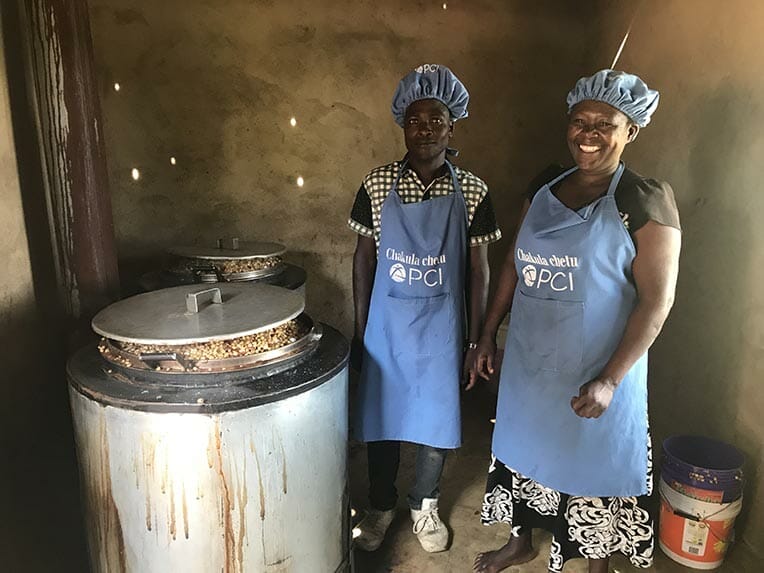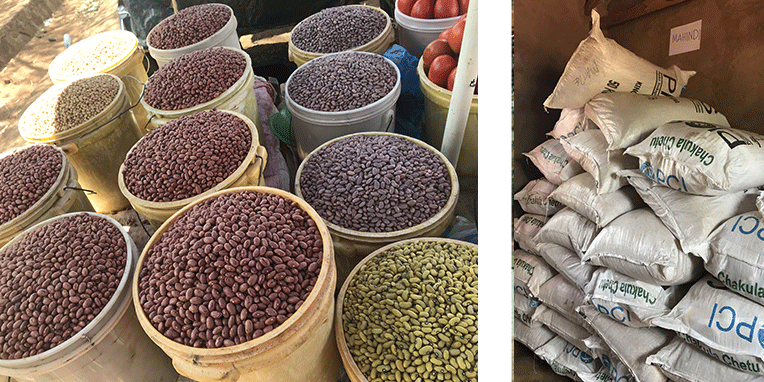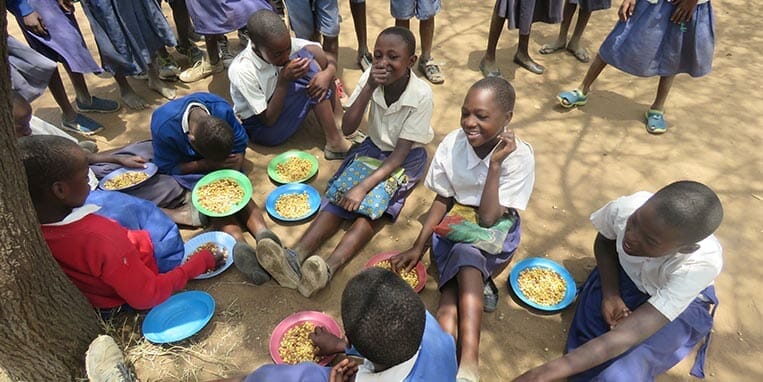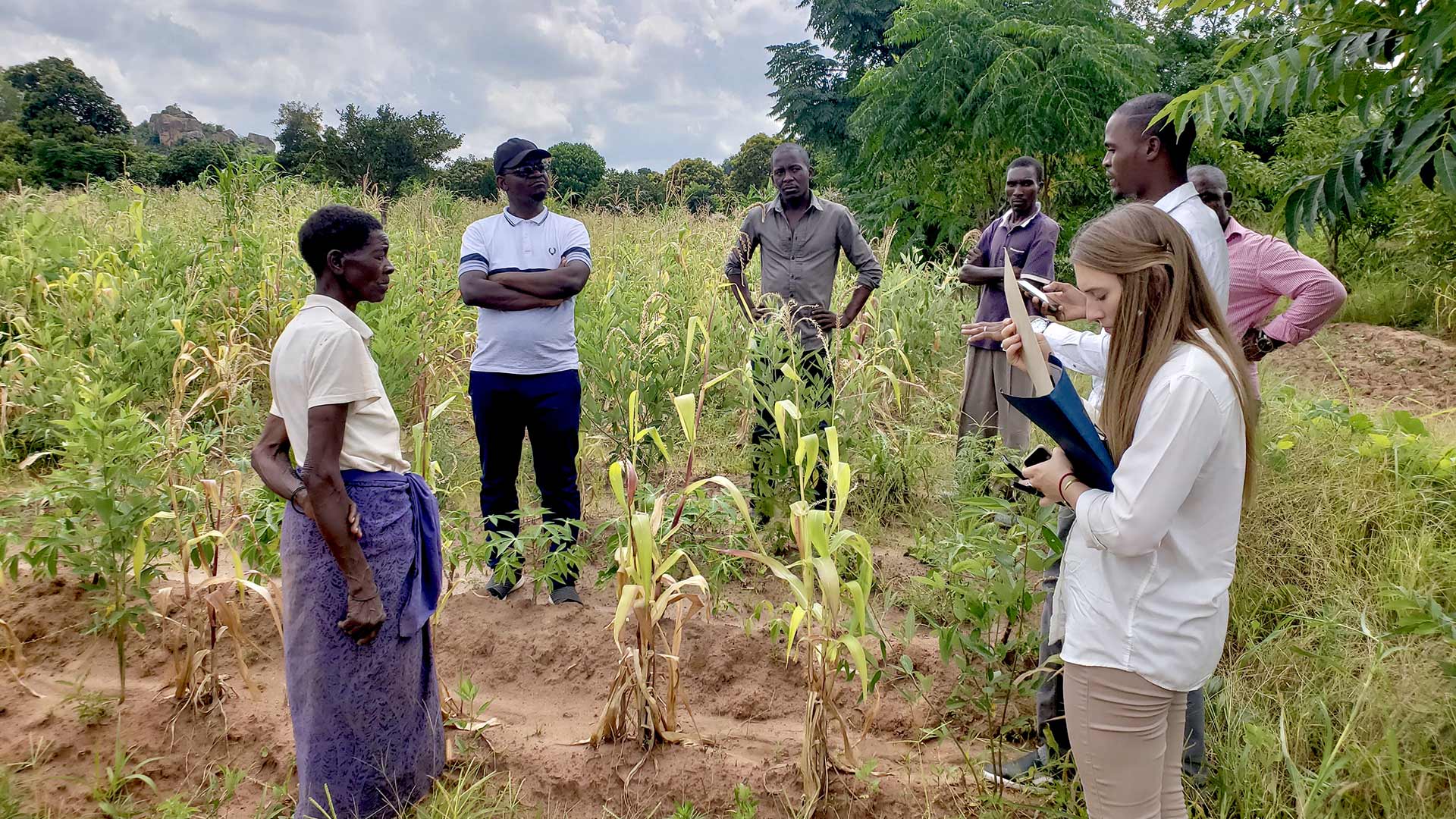Phones as Farm Hands: Fighting Fall Armyworm with Tech
Story by Maureen Simpson
Photos by Amy Ostrander & Jennifer Waugaman
Smallholder farmers and those who support them are adding smartphones to the arsenal of tools they use to protect their fields. PCI - in partnership with Dimagi - utilized human-centered design techniques to develop AfriFARM, an innovative technology that can help agricultural workers take action against the devastating pest of fall armyworm (FAW).
Ever since FAW first appeared in Africa in 2016, the pest has spread rapidly across the continent. Tanzania is one of 44 countries where the relentless insect poses a significant threat to the livelihoods and food security of vulnerable community and village-based farmers. Agriculture experts have estimated the potential damage to staple crops to be in the billions over the next few years.
"Farmers have difficulty distinguishing [fall armyworm] from other pests and do not know how to continuously scout for it in their fields or how to best take action when they do discover it," said Jennifer Waugaman, senior officer of Strategic Initiatives at PCI.

In ongoing consultations with government officials, PCI learned of one rural farmer in Bunda district who lost 90% of his crops to FAW in 2018. If the farmer had known at an early stage that the larvae of the FAW moth had burrowed into the stalks of his maize, he would have been able to treat it. But it wasn't until the maize began to tassel that he realized he had a problem - and by then it was too late. He lost nearly everything.
While some agricultural extension workers are now being trained on FAW, they are not equipped with proper management or surveillance tools. That's where AfriFARM comes in.
The app enables local governments, agricultural extension workers and community-based lead farmers to effectively monitor and respond to FAW, providing near real-time data to support critical action at just the right moment. The innovative solution became a prize winner at the U.S. Agency for International Development's Feed the Future Fall Armyworm Tech Prize Challenge in 2018. With the award, PCI began pilot testing AfriFARM in Tanzania in 2019.
Over 8 weeks between April and June, 47 agricultural extension workers scouted 372 smallholder farmer fields and found FAW infestation rates varying from 59% in Musoma district to 34% in Bunda TC. Prior to using AfriFARM, data like this was hard to capture and monitor. The app automatically calculates plot sizes and infestation rates and then provides appropriate prevention and/or treatment options instantly. Recommendations are both non-chemical and locally approved chemical controls, and instructions are translated into the local language.

After only three months of use, AfriFARM users improved their knowledge on how to respond to FAW by 14-percentage points. At the beginning of the pilot, 92% of users reported the pest was a significant problem in their community. After using AfriFARM, only 34% reported the same, suggesting the app has given them the tools, knowledge and confidence to effectively manage FAW in their communities.
Through focus group discussions designed to explore AfriFARM users' experiences, one Tanzania extension agent said: "Previously, we were not confident, because we did not have enough information and knowledge on fall armyworm management. Currently, we are so confident, because we are aware and have knowledge on how to scout, treat and monitor fall armyworm. We have enough reference materials in the AfriFARM application to back up whenever we need to do so."
According to Amithay Kuhanda, Agriculture Manager for PCI Tanzania, time saving is another important element influencing users to adopt AfriFARM. He said 90% of pilot test participants reported the app saves them time as compared to traditional paper monitoring tools, thus enabling them to spend more time with farmers and visit more fields each week.
In September 2019, PCI held a meeting in Dodoma, Tanzania's national capital, to share AfriFARM with the Ministry of Agriculture and technical experts in the field.
"The government requested an immediate expansion of our current AfriFARM work in three districts to the rest of the Mara Region," Kuhanda said.
PCI intends to continue making user-driven app improvements and building on collaborative relationships such as this with both the public and private sectors.
Community Support Vital to School Meals in Tanzania
Story by Maureen Simpson
Photos by Victor Mapile & Amy Ostrander

What's in a name? When it comes to Chakula Chetu, the answer is everything.
The program, which means "Our Food" in Swahili, takes an innovative and integrated approach to school meals by ensuring both "what" and "who" is at the table emphasizes local food and local ownership. PCI, with support from the U.S. Department of Agriculture, currently implements the program in the Butiama district of Tanzania's Mara Region.
As part of Chakula Chetu, PCI provides daily school meals to more than 14,460 students in 16 primary schools using locally-purchased food. The program also builds the capacity of local stakeholders to eventually lead and manage their own school meals programs. This collaborative network includes local government officials, market actors, school administrators, farmers, parents and other invested community members.
To enable a transition from external support to community-owned and sustained programming, Chakula Chetu focuses on helping schools and farmers increase their agricultural production and links to local food markets.
For example, prior to Chakula Chetu, only two of the 16 participating schools had functioning school gardens. Now, all 16 schools have established gardens that produce diverse and nutritious vegetables.
"Teachers have been trained on post-harvest handling. We have also been supplied with modern seeds," said Charwi John, head teacher at Buturu Primary School. "We have been able to harvest 500 kg of maize from our school farm, and we are now planting fruit trees in our garden to supplement student meals."
As part of their curriculum, students learn how to help with care and maintenance and practice gardening at their homes as well.
"I have learned in the garden how to irrigate through drip irrigation and how to cultivate," said Velonica, a student at Nyanza Primary School. "It has helped that we are not [having to] purchase vegetables, and also it has helped us to get money for our needs, like buying [school] exercise books, pens and shoes."

While Chakula Chetu-purchased food is used for school meals three days a week, community-contributed food is used for meals two days per week. Parents and local farmer groups also contribute maize, beans, sorghum, salt and oil to provide commodities.
"I see this project being very helpful," said Bhoke Chacha, a parent from Nyanza village. "Because our children eat, they are now very happy. [Previously], a child would drop from school because of the distance of going home for lunch and returning for afternoon classes."
Since implementing Chakula Chetu, participating schools have seen a marked difference in student attendance and class participation, with one teacher noting an increase from 65% over the past two years to 85% in 2019.
Local farmers also benefit from the program by accessing inputs and financing critical to their farms and future growth. Through new linkages with the private sector, program-supported farmer groups have purchased more than 1,200 kg of improved seeds from private seed companies. Groups have also been able to access nearly $11,000 in loans due to effective interactions with financial institutions.
Additionally, Chakula Chetu has trained farmers in post-harvest handling and facilitated linkages to food suppliers, with the result of farmer groups selling 179,000 kg of crops to local markets and food commodity suppliers since the start of the program.
"Chakula Chetu has helped us local farmers with education on best farming practices," said Magdalena Wambura Bashiri, chairman of the Mkono kwa Mkono ("Hand to Hand" in Swahili) farmer group. "Before joining [the program], we used plant yields instead of seeds, and we were planting a mix of crops all at once on one farm. This led to very poor yields. Through regular training we receive from extension officers, this now has changed."

According to Dr. Emmanuel Gibai, a representative from the President's Office-Regional and Local Government, Chakula Chetu is closely watched and documented by the central government as a pilot.
"The aim in the end is to implement the success of this innovative model to other districts country-wide," he said.
Butiama District Commissioner Anna Rose Nyamubi also expressed her enthusiasm for the program and encouraged each District Council department to develop plans to mirror Chakula Chetu in all schools within Butiama district.












